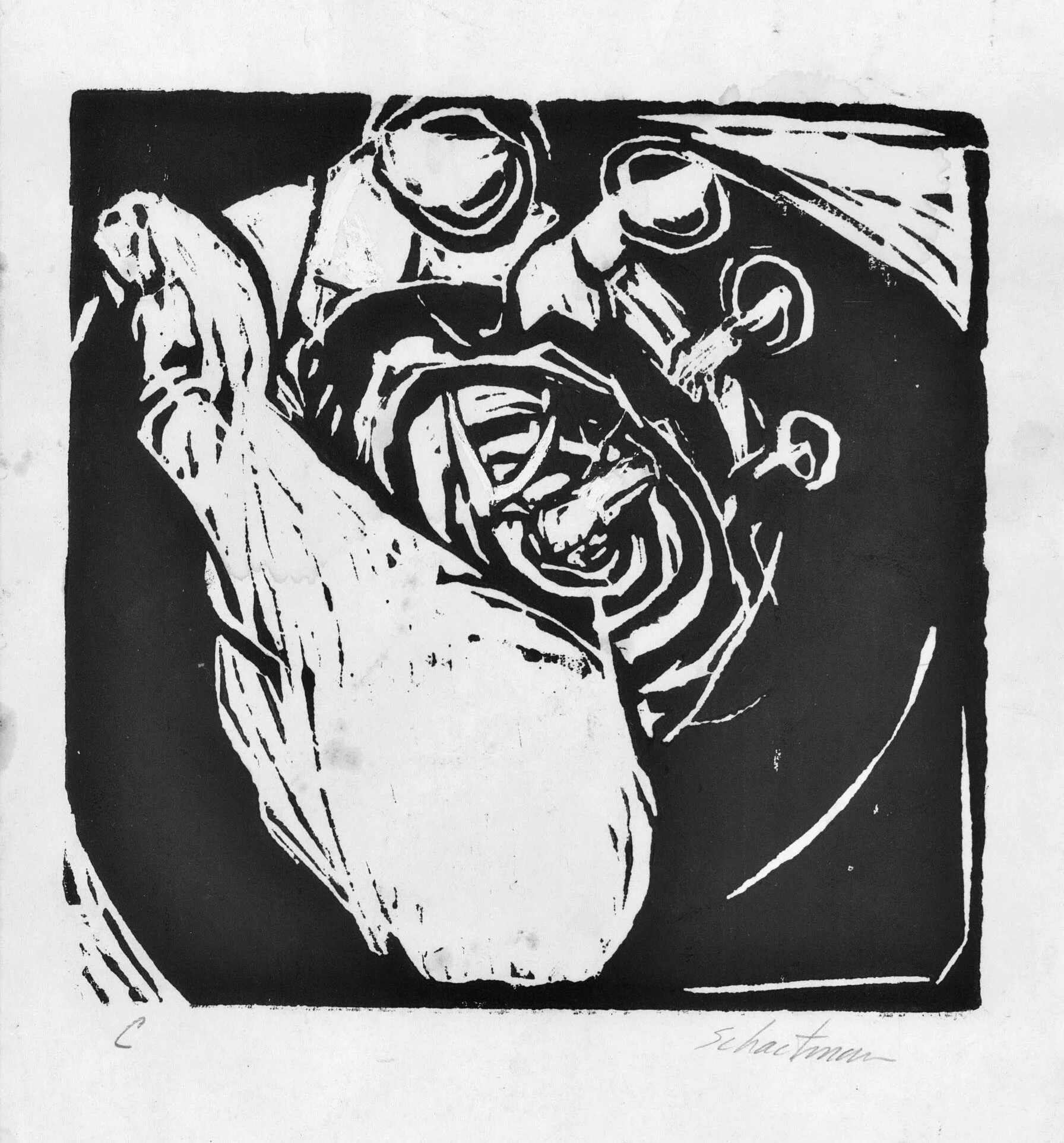Not a Memoir
BY FEATURED WRITER: LILLY DANCYGER
Joe Schactman, Hunter/Hunted, woodcut on paper, 6 1/2 x 6 inches, approx. 1995-98. Courtesy of Lilly Dancyger.
Not a Memoir
LILLY DANCYGER / MARCH 2021 / ISSUE 6
Three years into the process, I was having trouble adjusting to the idea that I was writing a memoir. I didn’t want to write about myself, I wanted to write about my father. But I couldn’t seem to do one without the other. I wanted to make a book of his art, immortalized images printed cleanly next to the story of his life, a canonization. But every piece of his story I uncovered led me back to my grief over his death, my anger at his addiction, the splintered relationship with my mother I’d been left with when he died. I kept saying the book I was writing was an artist monograph, but every day the words stared back at me, so clearly, defiantly, a memoir.
While I was wrestling with this memoir-not-a-memoir question, my goddaughter Riley came to spend the weekend with me. She was seven now, and excited that she recognized my apartment, and my cat, from the summer before. She was suddenly a fully conscious human being, where she’d always seemed like a baby before, even after she started elementary school. “I sleep on the inside, right?” she asked as she climbed the ladder up to my loft bed, remembering that I’d made that rule when she was smaller and I was afraid of her falling off. “That’s right!” I answered. The next day, we walked around the East Village, passing Tompkins on the way to get breakfast at Veselka. “Do you remember this park?” I asked her, wondering what else had cemented itself in her mind now that she was forming more tangible awareness of everything around her. She considered it seriously before answering, “I think you used to take me here.” “Yes, I did!” I responded, so relieved that she remembered. “This is Tompkins Square Park. You’ve been playing in this park since you were a little baby. And me and your mom met for the very first time here!” I watched the gears turn in her mind, reaching back through sense memory and association, deciphering her actual memories from what she’d been told.
I thought of all of those lazy teenage days in the park, with Jael and all our other degenerate friends, lying in big messy piles on the grass, watching our cigarette smoke float up to the trees, drinking warm, flat 40s. I remembered when Jael first met Jim, before they left for the Appalachian Trail where she got pregnant with Riley, and she brought him to the park to meet all of us. We were skeptical at first because he was so much older, but he was funny, and a fuck-up like the rest of us. He won me over when a church group approached us one day offering clean socks, sandwiches, and bibles. Jim accepted all three, tucked the socks and the sandwich into his bag, and then chucked the bible as far as he could, sending it sailing across the park. The clean-cut, timid young man who’d handed it to him watched it arc through the sky and land 50 feet away, and then looked back at Jim, who flashed him a big smile, and we all doubled over with laughter. I remembered the blackout in 2004, the year before Riley was born, when we all knew instinctively to meet in the park even though phones weren’t working, the buzzing energy in the air like we might loot or riot or we might just party all night.
I thought of all that happened in that park that lead up to Riley’s existence and her presence in my life, and how all of that was her story, even if she didn’t know it yet. I knew that when she was old enough to hear about that time, those stories would belong to her—even the parts that happened before she was born, because they were the circumstances that aligned so she could exist. I understood then that my father’s story was my story; that I’d been thinking of his story and mine as separate and not understanding why I couldn’t tell one without the other, but that of course my story was embedded in his, made out of his, and there was no way this was ever going to be just an art book and not a memoir.
Lilly Dancyger is the author of Negative Space, a reported and illustrated memoir selected by Carmen Maria Machado as a winner of the Santa Fe Writers Project Literary Award; and the editor of Burn It Down, a critically acclaimed anthology of essays on women's anger from Seal Press, named one of the "most recommended books of the season" by Literary Hub. She is a contributing editor at Catapult, and assistant editor at Barrelhouse Books. Lilly is the founder and host of Memoir Monday, a weekly newsletter and quarterly reading series co-curated by Narratively, The Rumpus, Guernica, Granta, Literary Hub, and Catapult, featuring the best memoir writers of today. Her writing has been published by Longreads, The Washington Post, Glamour, Playboy, Rolling Stone, and more. She lives in New York City.
